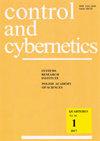Towards cognitive decision support: A model of behavioural assessment of multi-criteria methods
Q4 Engineering
引用次数: 0
Abstract
Abstract The Negotiation Support Systems often implement multiple criteria decision aiding (MCDA) techniques for building a negotiation scoring system. Those formal models should meet the needs, motivations, expectations, and cognitive abilities of users. In this paper, we try to explore the effects of decision maker’s subjective perception of ease of use, time requirements, interface, preference representation, and efficiency of a particular MCDA method on the choice regarding the future use of this method. The multinomial logistic regression model is built and analysed. The analysis is based on data from online decision making experiments, where three MCDA methods were implemented, i.e. AHP, SMART, and TOPSIS. The study provides several interesting findings, concerning the behavioural aspects of multiple criteria decision aiding in software support systems. Most of the users recommended TOPSIS as the best one for supporting decisions in the future. This is a fast technique, for which we used an attractive graphical interface, suggesting that these factors play a crucial role in the users’ choices. However, the causative regression model showed that the user’s positive experience in using a particular method, i.e. its effectiveness in solving an exemplary numerical case, has the highest impact on the method’s choice for future use. The second most important factor is the adequacy in representing the user’s preferences by this method. We show, however, that the strengths of effects and their significance may vary across the methods. Understanding the decision maker’s evaluations of the MCDA techniques may help build a cognitive negotiation support system that satisfies the user’s expectations.认知决策支持:一个多标准方法的行为评估模型
谈判支持系统通常采用多准则决策辅助(MCDA)技术来构建谈判评分系统。这些正式的模型应该满足用户的需求、动机、期望和认知能力。在本文中,我们试图探讨决策者对特定MCDA方法的易用性,时间要求,界面,偏好表示和效率的主观感知对该方法未来使用的选择的影响。建立了多项逻辑回归模型并进行了分析。分析基于在线决策实验的数据,其中实施了三种MCDA方法,即AHP, SMART和TOPSIS。该研究提供了几个有趣的发现,涉及软件支持系统中多标准决策辅助的行为方面。大多数用户推荐TOPSIS作为未来支持决策的最佳方法。这是一种快速的技术,我们使用了一个有吸引力的图形界面,这表明这些因素在用户的选择中起着至关重要的作用。然而,因果回归模型显示,用户在使用特定方法时的积极体验,即其在解决示例性数值案例中的有效性,对该方法未来使用的选择影响最大。第二个最重要的因素是,这种方法是否充分地反映了用户的偏好。然而,我们表明,效应的强度及其重要性可能因方法而异。了解决策者对MCDA技术的评价有助于建立一个满足用户期望的认知谈判支持系统。
本文章由计算机程序翻译,如有差异,请以英文原文为准。
求助全文
约1分钟内获得全文
求助全文
来源期刊

Control and Cybernetics
工程技术-计算机:控制论
CiteScore
0.50
自引率
0.00%
发文量
0
期刊介绍:
The field of interest covers general concepts, theories, methods and techniques associated with analysis, modelling, control and management in various systems (e.g. technological, economic, ecological, social). The journal is particularly interested in results in the following areas of research:
Systems and control theory:
general systems theory,
optimal cotrol,
optimization theory,
data analysis, learning, artificial intelligence,
modelling & identification,
game theory, multicriteria optimisation, decision and negotiation methods,
soft approaches: stochastic and fuzzy methods,
computer science,
 求助内容:
求助内容: 应助结果提醒方式:
应助结果提醒方式:


